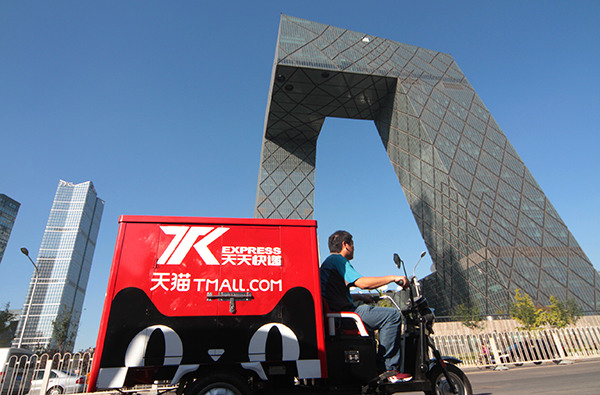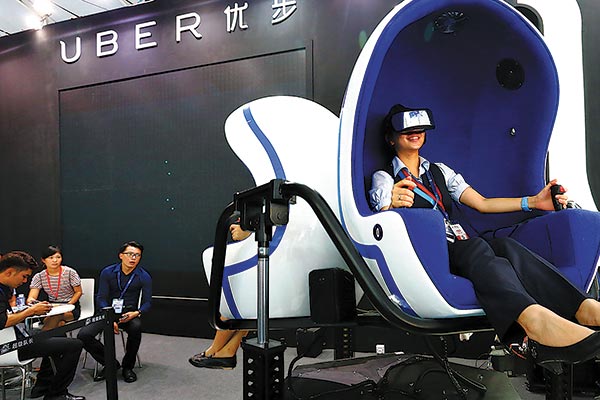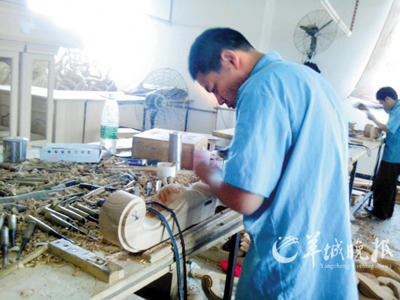China’s Haier to Buy GE Appliance Business for $5.4 Billion
January 15th, 2016By LAURIE BURKITT, JOANN S. LUBLIN And DANA MATTIOLI
Updated Jan. 15, 2016 5:17 a.m. ET

BEIJING— General Electric Co. agreed to sell its appliance unit for $5.4 billion to Chinese manufacturer Haier Group, which is looking to expand its products into homes around the world.
GE and Haier announced the deal Friday, saying the companies will cooperate world-wide to expand their reach in health care, advanced manufacturing and the industrial sectors.
The deal will help Haier sell refrigerators, washing machines and other appliances that are already popular in China overseas after years of struggling to gain a stronger foothold in the U.S. and elsewhere. Haier said it will have the rights to use the GE brand for appliances for 40 years.
The acquisition also enables GE to focus on its industrial business—jet engines and power turbines instead of washing machines and even finance.
“Haier has a good track record of acquisitions and of managing brands,” GE’s chairman and chief executive officer Jeff Immelt said in a news release. “Haier has a stated focus to grow in the U.S., build their manufacturing presence here, and to invest further in the business.”
Advertisement
Qingdao Haier Co., a Shanghai- listed company in which Haier owns 41%, will acquire the GE appliance unit, Haier said. It said the deal “establishes a model for cross-border investment and cooperation between China and the United States.”
The deal, which values GE Appliances at 10 times the last 12 months of earnings before interest, taxes, depreciation and amortization, according to GE, was reported earlier by The Wall Street Journal.
It marks the third major overseas acquisition by Chinese companies this week.
RELATED
China’s Haier Nears Deal to Buy GE Appliance Business
A consortium of investors including China National Chemical Corp. on Sunday agreed to buy KraussMaffei Group for 925 million euros ($1 billion), one of the largest Chinese takeovers of a German company. Two days later, Chinese conglomerate Dalian Wanda Group Co. agreed to acquire production and finance company Legendary Entertainment for $3.5 billion in cash, the largest China-Hollywood deal to date.
GE has been running an auction for the century-old appliance business since it abandoned a $3.3 billion sale to Sweden’s Electrolux AB in December. The U.S. Justice Department had sued to block that transaction, saying the combination of the two companies would hurt competition for cooktops and ranges. Haier is unlikely to face the same antitrust hurdles as Electrolux because of its small presence in the U.S.
In seeking a fresh buyer, GE executives wanted “a better deal” than they had gotten from Electrolux, one person familiar with the matter said. GE also stands to receive a $175 million breakup fee from Electrolux.
The Chinese appliance maker outbid other foreign corporate bidders for the Louisville, Ky.-based business, according to a person close to the deal.
Haier has struggled to compete in the U.S. While it calls itself the biggest appliance maker in terms of unit sales, Haier is mainly known in the U.S. for niche products such as compact refrigerators and window air-conditioning units.
The privately held company has also been expanding its range of products and retail partners in the U.S. Last August, Haier said it would invest $72 million to expand its 15-year-old refrigerator plant in Camden, S.C.
The GE transaction, however, will vault the Chinese company past Electrolux and other rivals in the U.S. market for white goods, which is currently led by Whirlpool. Sales for the GE Appliances and Lighting division, of which appliances is the lion’s share, were $8.4 billion in 2014.
Haier held talks with GE in 2008 to buy the U.S. firm’s appliance unit. In 2010, a Haier executive said the company didn’t buy at the time because the price for the unit was too high. Haier also made an unsuccessful bid for Maytag Corp. in 2004, but lost out to Whirlpool.
Since then, Haier has been vying for more U.S. retail partners, tapping major advertising agencies in an effort to become a household name. Haier held a 29.8% market share of major household appliance sales in China last year, compared with 5.6% in the U.S., according to market research firm Euromonitor.
For Haier, which had $32.6 billion in revenue world-wide in 2014, growth overseas is critical. Profit margins from the company’s refrigerators and washing machines in China are razor-thin due to increased competition at home, where online shopping has sparked price wars, pushing down prices in the electronics and appliances sector.
Another drag on business is that fewer people in China are buying new homes and thus need fewer new appliances.
The deal will broaden Haier’s customer base and distribution channels. It will also sharpen its credibility in the U.S., where “Chinese brands are perceived as low quality,” said Klaus Meyer, a business professor at China Europe International Business School in Shanghai.
Based in China’s northeastern coastal city of Qingdao, Haier is one of China’s legacy state-owned enterprises. Haier’s chief executive, Zhang Ruimin, was the general manager when the company started in 1984 as a successor to a loss-making refrigerator factory that had been opened in 1949, when Chairman Mao Zedong founded modern China.
Mr. Zhang, now 67, has become somewhat of a legend in business circles back home, building a no-nonsense demeanor when he, as newly appointed chairman in 1985, grasped a sledgehammer, smashing a faulty refrigerator to demonstrate zero tolerance for shoddy products at the factory.
Within his first decade as chairman, he transformed Haier, creating China’s largest appliance maker and becoming the first businessman appointed to China’s Central Committee, one of the Communist Party’s highest decision-making bodies.
Mr. Zhang built the brand by investing in a cartoon in the 1990s called the “Haier Brothers,” creating mascots that generations in China came to recognize long after the airing of the more than 200 episodes. Today, Haier has become one of the China most valuable brands, worth $1.9 billion in 2015, according to media agencies Millward Brown and WPP, which calculated the value using the company’s financial data and consumer survey data.
GE Appliances will keep its headquarters in Louisville, Ky, the companies said.
Haier said in a statement to the Shanghai Stock Exchange if the deal ceases due to failure to obtain approvals from antitrust regulators, Chinese regulators or Qingdao Haier’s shareholders, Qingdao Haier will be required to pay $200 million to $400 million to GE as compensation.
GE’s assets Haier is acquiring had a book value of 1.84 billion dollars as of the end of 2014.
—Ted Mann in New York and Rose Yu in Shanghai contributed to this article.
China foreign service trade deficit narrows
December 31st, 2015China continued to see a deficit in foreign service trade in November but the volume has narrowed, data from the State Administration of Foreign Exchange (SAFE) showed on Wednesday.
The deficit came in at 15.6 billion U.S. dollars, retreating from 89.2 billion U.S. dollars in October.
The State Council has pledged measures to accelerate development of trade in services, including gradually opening up the finance, education, culture and medical treatment sectors.
SAFE began issuing monthly data on service trade in January 2014 to improve the transparency of balance of payments statistics. Since the start of 2015, it has also included monthly data on merchandise trade in its reports.
In November, China saw a surplus of 51.4 billion U.S. dollars in foreign merchandise trade.
Alibaba to add 200 staff to fight against counterfeit products
December 29th, 2015
A delivery cart with the logo of Tmall.com, Alibaba's B2C platform, passes the CCTV building in Beijing.
E-commerce giant Alibaba Group Holding Ltd is expected to add 200 personnel in an effort to up its game in the fight against counterfeit products, the company's senior executive said on Monday.
Zheng Junfang, an Alibaba partner, announced that Alibaba will add 200 people to cooperate with Chinese government organizations to crackdown on counterfeit products online, despite the group's earlier announcement to strictly control its recruitment quota in fiscal year 2015.
Zheng made the announcement when she gave her first media interview as the group's chief platform governing officer, a role responsible for cracking down on fake products online and protecting intellectual property.
She said counterfeit products are the "tumors of society". "Counterfeit products are a challenge faced by all e-commerce platforms," Zheng said.
According to her, Alibaba used a combined method to fight against fakes. On one hand, Alibaba uses big data technology to trace the sources of fake products and reports the information to Chinese authorities. On the other hand, the company supports the growth of self-developed brands online.
According to Alibaba, it has invested more than 1 billion yuan ?$154 million?in fighting against counterfeit products on its online platforms. It has about 2,000 full-time employees responsible for fighting fakes and 3,000 part-time volunteers.
The new development in fighting against fakes comes days after the Office of the US Trade Representative said it was "increasingly concerned" about Alibaba's measures to tackle counterfeit products and that more needed to be done.
Alibaba did not reply to the comment, but last Monday it announced it was hiring Matthew Bassiur, vice-president and deputy chief security officer at United States drugmaker Pfizer Inc, to head its global intellectual property enforcement.
Uber-GAC deal to legitimize car-hailing service, boost sales
December 28th, 2015
Uber has been in the headlines since it came to China last year.
Chinese automaker Guangzhou Automobile Group is expected to become an investor in Uber's operations in China, in a move experts believe will boost the State-owned carmaker's sales performance and help the car-hailing company win legitimacy.
"One of our subsidiaries is planning to take part in Uber's B-round of financing… negotiations concerned are underway so details are not being released for the sake of the interests of the parties involved," GAC said in a reply on Dec 24 to an inquiry from the Shanghai Stock Exchange.
The inquiry came when GAC's stock price experienced a rare daily limit increase on Dec 23, one day after the Shanghai-listed automaker announced a "comprehensive" deal with Uber that covers investment, sales, maintenance as well as financing and leasing.
Uber will release results of its B-round of financing sometime after Christmas, said Liu Zhen, head of Uber's China operations, at a news conference in late November.
Analysts said the cooperation would boost GAC's performance in sales and after-sales services.
"We believe that Uber will become an important sales channel of GAC's cars and services," said Wang Dean, an auto analyst at Pingan Securities.
"It is likely that Uber users will become GAC potential customers while GAC can authorize its dealerships to recommend Uber's car-hailing app to their customers. In addition, GAC can send messages about maintenance and used cars as well as car leasing to Uber users, helping steer online customers to offline stores."
Uber entered the Chinese market in February 2014 and is now available in 22 cities. It said it has a 35 percent share in China's car-hailing market and will enter 100 cities in 2016, with the focus on those with a population of 3 million or more.
Despite the popularity of car-hailing apps, both Uber and its rival Didi were summoned this year in Beijing and Shenzhen as they were suspected of organizing private cars for transport services.
Law enforcement officials earlier this year swept Uber's offices in several cities including Chengdu and Guangzhou, where GAC is headquartered.
Yale Zhang, managing director of Automotive Foresight, said Uber's deal with GAC might prevent similar incidents and help Uber further penetrate the local market.
"Guangzhou is one of China's four top-tier cities and it might serve as a strategic point for Uber to bargain about its legitimacy nationwide if it is well established in such an important city."
Earlier this year, Uber co-founder and CEO Travis Kalanick said the company would seek Chinese investors and partners who know how to interact with the government and who can help localize Uber for the Chinese market.
At the November news conference, Liu emphasized the concept by calling the entity she oversees "China Uber" rather than Uber China.
It finished its first-round financing in September, during which the company received $1.2 billion from investors including Baidu.
Downturn adds to salary woes of migrant workers
December 25th, 2015
A worker at a furniture workshop in Dongguan, Guangdong Province.
Cases of salary cuts or pay defaults involving migrant workers increased by 34 percent in the first three quarters, partly due to the ongoing economic downturn, according to a trade union official.
Zhang Bo, an official at the All-China Federation of Trade Unions, said such cases and other violations of workers' rights are still rampant, especially in Guangdong, Anhui and Heilongjiang provinces and the Inner Mongolia autonomous region.
"They are no longer limited to the construction industry?they have spread to the manufacturing sector as well," he added.
According to the business news website Yicai.com, only 30 percent of manufacturing companies can pay wages on time. Many such companies are facing financial strains and are having to make huge layoffs.
Last year, there were 274 million migrant workers in China, with an average monthly income of 2,864 yuan ($572.8), according to a National Bureau of Statistics report released in April 2014.
The report said 0.8 percent of the migrant workers, or 2.19 million, could not receive their pay on time.
The average salary amount in default was 9,511 yuan. More than 60 percent of the migrant workers did not sign labor contracts with employers.
Zhou Litai, a lawyer specializing in protection of migrant workers' rights and interests, said the situation this year could be even worse because the economic downturn has affected many traditional industries.
"The wage cuts and defaults happened mostly in the construction sector. Most migrant workers cannot get their money until a project is completed," said Zhou, who is based in Chongqing.
"Many projects were illegally outsourced several times before they were officially started.
"What is worse, some project contractors borrowed money from loan sharks. When they receive payment for the project, they have to pay the loan sharks first, and then have no money for the migrant workers," Zhou said.
Zhang said his federation would support the government in establishing a monitoring and warning system on salary-related issues to help migrant workers get paid. "Some local trade unions also explored a new mechanism to ensure migrant workers receive payment. For example, the union in Shanxi province has set up a fund that will pay migrant workers first before getting the money back from their employers."
17 banks have fund-manager licenses revoked
December 24th, 2015The China Banking Regulatory Commission has revoked the private fund-manager licenses of 17 commercial banks, over what sources said were legal concerns.
A person close to the CBRC said on Wednesday the specific reason could be that they had violated certain conditions under the Law on Commercial Banks, which does not allow lenders to operate integrated securities investment operations.
Instead, they have to set up subsidiary companies to engage in the business, but only after undergoing close government examination and approval.
The 17 are believed to include China Everbright Bank, Ping An Bank, SPD Bank, China Minsheng Bank, Bank of Ningbo, Bank of Beijing and China Zheshang Bank.
Five of these banks registered departmental general managers with the Asset Management Association of China as their qualified private fund managers, while the 12 others named their chairmen, according to Caixin Media.
Nine of the banks applied as securities investment managers, four as private equity investment firms, and four as other types of investment operations.
All private equity and securities investment funds are required to register with the Asset Management Association to gain licenses.
The Asset Management Association declined to comment on the issue.
Huang Peng, a partner at Beijing-based Guantao Law Firm, said commercial banks conducting such investment business remain controversial, both in China and overseas.
Some have suggested that banks running simultaneous lending and investment operations could increase the risk of moral hazard, while others have said it is feasible, as long as different departments manage the businesses separately.